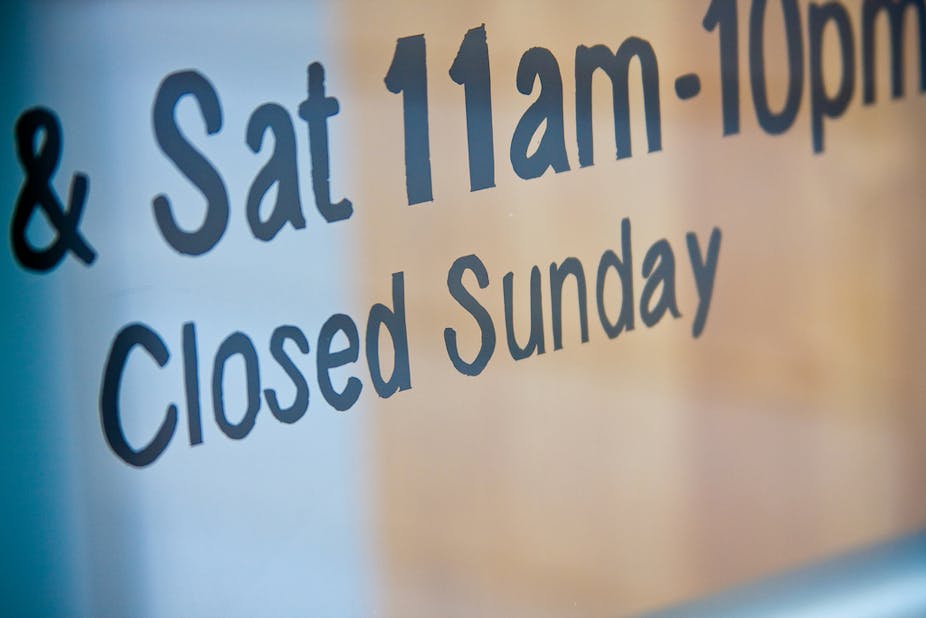A new agreement in South Australia has opened the door for the reduction and even removal of penalty rates in the retail sector.
Heralded on the front page of The Australian newspaper as “historic”, the deal is being viewed as a potential game changer in what industry groups like Restaurant & Catering Australia (RCA) see as employers’ “historic fight” against penalty rates.
The new template enterprise agreement struck between Business SA and the Shop, Distributive and Allied Employees’ Association (SDA) allows for substantial cuts to penalty rates in return for an increase in base pay and new rights to refuse shifts.
Is it a fair deal? The experiences of employees working for penalty rates, those most affected by the change, have been largely missing from the debate.
Unsurprisingly, most employer groups have welcomed the change. John Hart, CEO of RCA, has already voiced his support and hope that an example has been set for the hospitality industry. Kate Carnell, chief of the Australian Chamber of Commerce and Industry, sees the agreement as a model for a national approach.
Some politicians have also voiced approval. South Australian senator Nick Xenophon sees the change as a significant gain for young people:
“The issue I’m concerned about is young people have been losing their jobs, young people particularly, around the state because businesses have been shutting down on weekends, particularly small businesses in hospitality and retail.”
No guarantee of more jobs
Yet the evidence that cutting pay will lead to more employment is mixed, and contested. There are, for example, other reasons why small and medium retailers, or cafes and restaurants, may not open every day of the week.
Despite the talk of Sunday now being just like any other day, the reality is most of us are still not at work on Sunday. Parts of our cities are still primarily industrial areas or business districts that can buzz during weekdays but still seem like a ghost town come the weekend.
While employers, unsurprisingly, are quick to blame penalty rates for not opening their stores, a retailer or café owner in such areas is unlikely to decide to open on the weekend and to employ more staff simply because of this new agreement. There is little point if there will be very few customers.
Other outlets do very well during these times. In the right retail hubs – the city centres and malls – nights, weekends and public holidays are among the best trading conditions. Conditions are good because the majority are not at work and many want to go shopping. Penalty rates will not stop businesses opening when there are plenty of paying customers to serve.
Small to medium-sized businesses in competitive industries like retail often do it tough, particularly as they compete against bigger players and competitors who flaunt the existing rules on pay. Their perspectives are important. But the voices of employees also need to be heard.
My research has involved surveying and interviewing young people about their experiences of work. Many earn penalty rates, with work in retail and hospitality particularly common.
These young people appreciate weekend work because the additional pay means a little less time at work, as well as a little less trouble paying the bills. They do not appreciate weekend work because they “like” to work Saturday and Sunday.
If you work at these times you miss out on things that others do not. Relationships can suffer too. The concerts, sporting events, birthday parties and family gatherings that provide the social glue in our society are still scheduled overwhelmingly on Friday nights, Saturday and Sunday.
One participant described the impact of working on the weekend like this:
“You’re working when your friends, family or partner are at home.
Another said that it made "planning future occasions with friends and family hard”. Most starkly, one of my participants described the impact of too many weekends and nights at work like this:
“No social life, bad sleeping patterns and no friends.”
Who has the upper hand?
SDA Secretary Peter Malinauskas is reported as seeing the agreement as a “big win” for workers, worth trading away penalty rates, as it gives them a pay rise and new rights to say no to work on Sundays.
The increase in base pay will indeed benefit some employees, particularly full-time employees who tend to work few weekends already. I would be surprised if casual employees who depend on weekend work see it as a win for them. Some need to work on these days; others will feel pressure to do so, but now for less pay, no matter that they have the “right” to say no on paper.
For Malinauskas’s claim of a big win for workers to hold seems to depend on employers and each employee having equal negotiating power. Particularly in the context of high youth unemployment, this seems unlikely.
Reducing the conditions of some workers to stimulate the broader economy is particularly questionable when those targeted are some of the least powerful and least well-paid employees. While this agreement may or may not lead to more jobs, it appears to guarantee that young casuals, and not so young, who do work nights, Saturdays and Sundays will receive less.
The decision by the SDA to enter into such an agreement at this time appears particular strange, and the timing particularly serendipitous for employers. The Productivity Commission has just begun to wade through submissions to its Inquiry into the Workplace Relations Framework and the Fair Work Commission is in the middle of its four-yearly review of modern awards. Employer groups are hoping, and many others fearing, that a precedent has been set.

